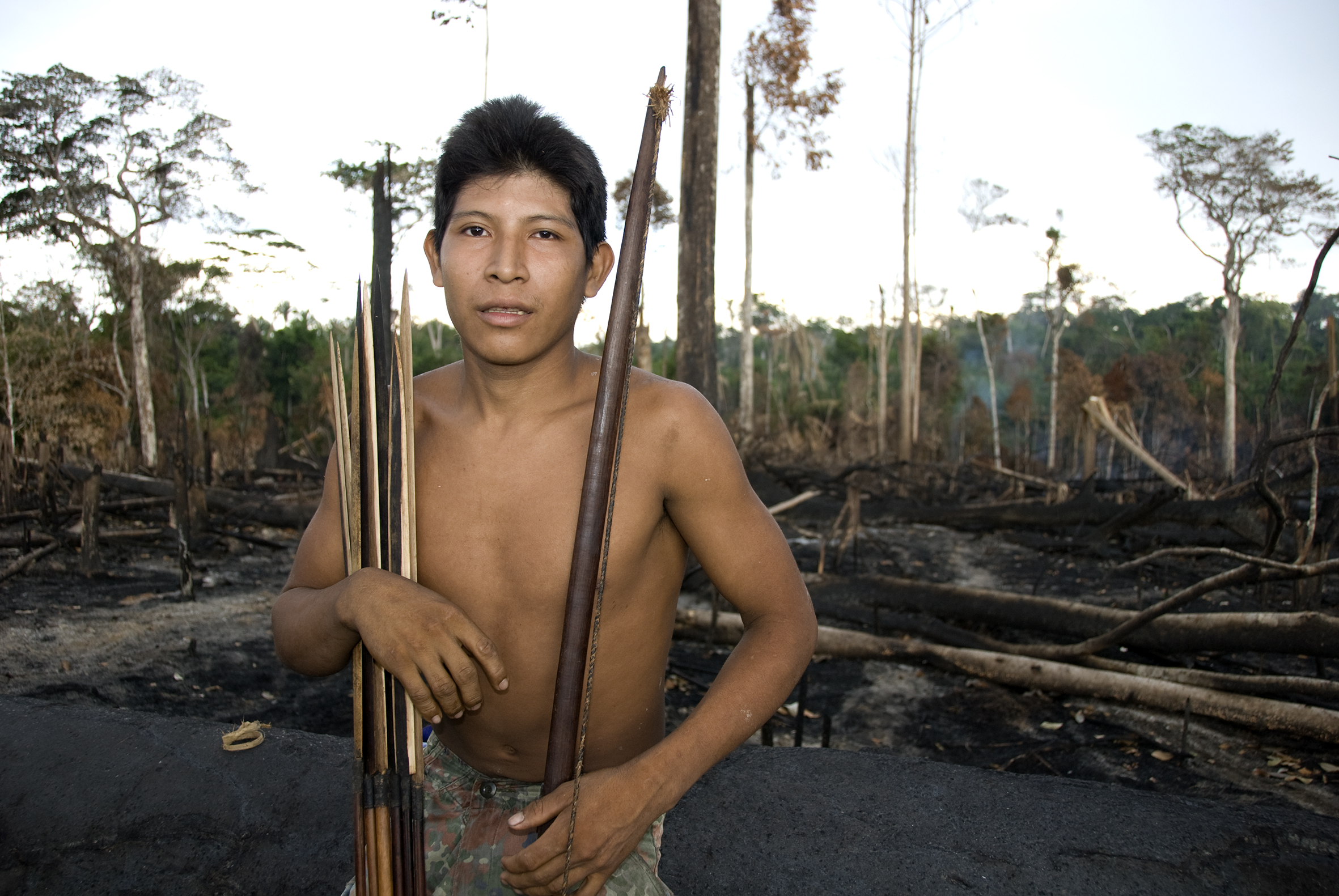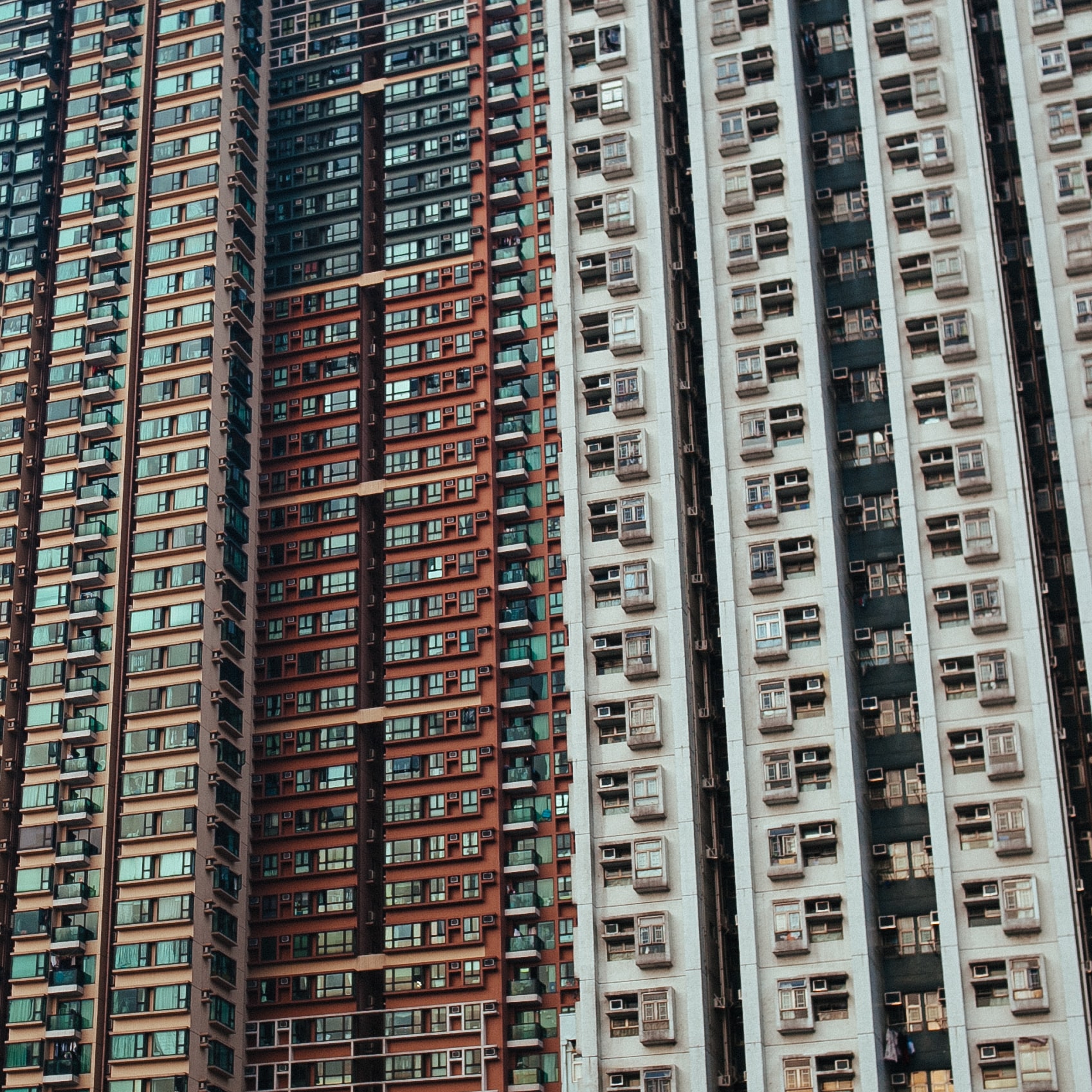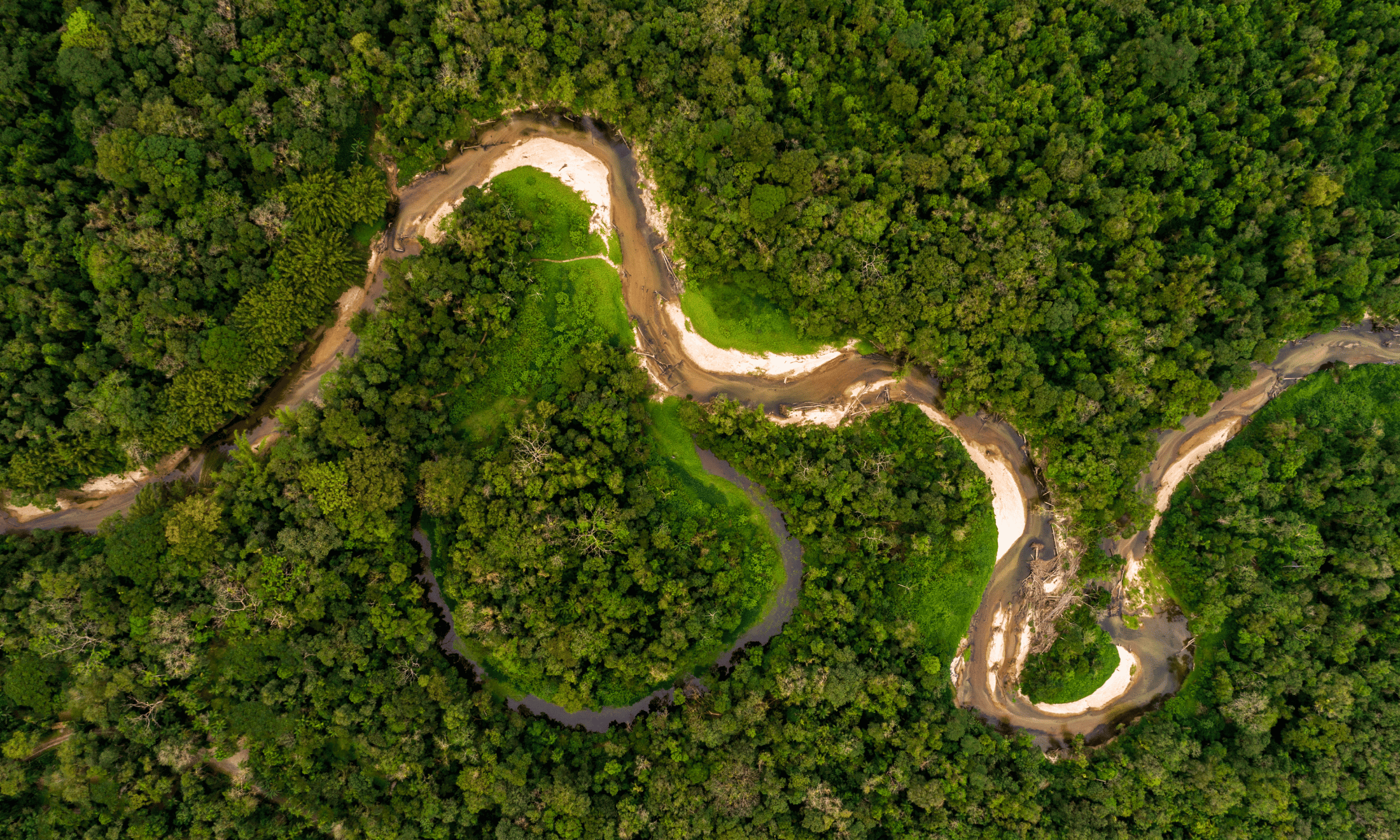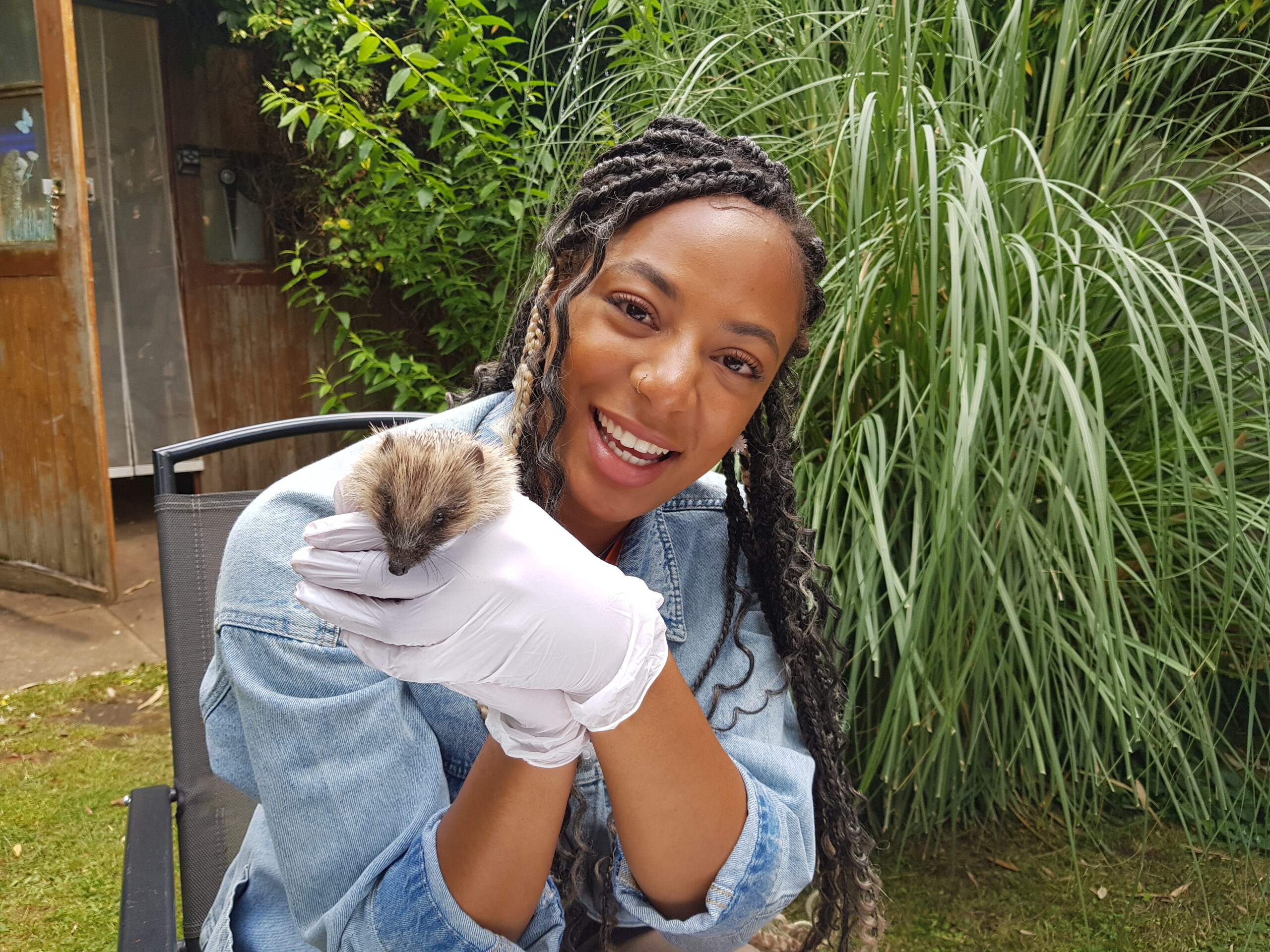
As the Amazon burns, why aren’t we hearing from indigenous voices?
Sofia Ferreira Santos
27 Aug 2019
Hemokoma’á stands in smouldering forest in the Awá territory, more than 30% of which has been burned and destroyed by illegal invaders. Photography by Fiona Watson/Survival International
The Amazon rainforest is burning. It has been burning non-stop for three weeks, yet public outrage has only just started to mount on social media and global news outlets. Kiga Prado, a 19-year-old LGBTQI+ Bororo indigenous activist from the Meruri village tells me that the general public and the government are failing to realise the significance of this land to Brazil’s indigenous groups and the deeper destruction caused by the flames. “Brazil’s government can’t see or even try to understand why we fight to protect our Mother Land” they tell me, “what is happening to the Amazon, the heart of Brazil, is something which hurts all indigenous souls and our cultural ancestry.”
The number of fires in the Amazon has grown by 84% this year, with the INPE (the National Institute for Space Research) in Brazil reporting almost 73,000 fires in the past eight months alone. As international coverage begins to take shape, news reports and sentiments of solidarity focus solely on the concerns and interests of people far from the Amazon, using the fires as a platform to talk about veganism and climate-change lobbying. This platforming of issues not originating from indigenous people directly affected by the fire extends the Brazilian press’ general sidelining of indigenous voices to a completely new, global level. Despite Brazil being home to almost a million indigenous citizens, its major media outlets employ almost no indigenous journalists. It’s no surprise that indigenous perspectives are not centred in commentary on their own livelihoods.
Social media users throughout North America and Europe have started to #PrayForAmazonia out of fear that if the “lungs of our planet” die, they will start to feel the impact of the fires. Others have also been using this as an opportunity to further their personal agendas: vegan commentators post pictures of the Amazon burning as a way to shame meat-eaters and push the meat-free movement, instead of holding to account the new government and the agricultural industries who are responsible for this disaster. Seeing the “if you eat meat, you’re responsible for the Amazon fires” comments all over my timelines has been one of the most frustrating and dehumanising parts of this tragedy as a Brazilian living in the UK. The global response has seemed to only include concern for the lives of the indigenous population as an afterthought.
“It’s notable that mainstream national coverage of the fires only gained traction when São Paulo experienced large dark clouds hanging over the city”
Social media prayers and lamenting tweets feel like virtue signalling, and we should question how much real solidarity they offer to people dealing with the blazes. Incessant vegan superiority and the prioritisation of meat-free ideology in conversations about the Amazon fires, particularly in online spaces is blatant racism, and places the lives of indigenous people at the bottom of the pyramid of importance. It’s notable that mainstream national coverage of the fires only gained traction at the beginning of last week when São Paulo experienced large dark clouds hanging over the city.
There’s no single cause to blame for the rise in this destruction. A combination of government cuts leading to decreased resources allocated for IBAMA – the country’s environment agency – for patrolling the rainforest, and government support of agricultural queimadas (purposely lit forest fires), demonstrated by a significant decrease in fines issued by IBAMA for deforestation, have all resulted in the sharp increase of illegal deforestation. The indigenous population of Brazil have been consistently forced to adapt to smaller and smaller territories for decades, and now the Bolsonaro government wishes to establish even stricter and more confining regulations as one of its main agricultural campaign plans. The 14% of Amazonian land which currently belongs to Brazil’s indigenous population has been the subject of a number of legal battles throughout Bolsonaro’s administration – and this land is also a big part of the area which is currently alight and burning.
Kiga believes that change will only come once all of us, especially those with governmental and political power, begin to accept the blame for this catastrophic destruction. Instead of affecting only the indigenous land, Kiga says “this fire and deforestation is affecting our global system, and we need to acknowledge our own blame instead of focusing on a detached vision of the ‘end of the world.’”
Though Brazil’s many indigenous groups are spread throughout the country, there is a deep sense of connection to the Amazon and its resources, both within indigenous lifestyle and culture. Kiga, whose traditional name signifies a hawk’s horn, explains the frustration in seeing “no one talk[ing] about how [the fires] are affecting the customs, traditions and the connections the indigenous have with nature”. The focus on Western and industrial perspectives of the fires is a huge disservice to the indigenous population who have inhabited the land for centuries, with Kiga highlighting that people who aren’t from indigenous communities “won’t be able to explain this connection which we have with our land and our Mother nature, as for us nature is like a mother, we give her what she needs, nurture her, without having to cause deforestation”.
“Bolsonaro himself has made wild suggestions that the fires were started by NGOs lashing out in the face of funding cuts”
Ignoring the significance of nature to indigenous culture, alt-right Brazilian groups and the right-wing president have been attributing the fires to the indigenous population and environmental NGOs. Bolsonaro himself has made wild suggestions that the fires were started by NGOs lashing out in the face of funding cuts, and has scoffed at the title “Capitão Motoserra” (“Captain Chainsaw“) given to him in recognition of his destructive environmental policies – in reality the real cause of the blazes.
To Kiga, Bolsonaro’s words are those “of a person who commits terrible acts which destroy our Brazil and is ashamed to admit his wrongdoings in front of the press”. Indigenous groups do live off the land, but Kiga explains indigenous land isn’t cultivated “in a harmful way”, though this assumption has begun to circulate social media. “We take care of nature because she provides what we need to survive; we are the guardians of our Mother Land,” Kiga says, “and we don’t only take care of our land to the benefit of our own indigenous community but we do it so that the earth is a better place for all inhabitants of Mother Earth.” The difference in industrial, for-profit agriculture and indigenous forms of cultivation doesn’t only lie solely on their cultivation methods, but also on their understanding of how their actions impact the wider world, or the lack thereof.
As a young activist, Kiga is looking to what the next years and decades hold for the generations who will inherit the planet; they emphasise that our “present will be the future of millions of people”. In the Boe Bororo language, “Pagawo boe pegareu towuje Pawobe nure pugi” reflects the perspective many indigenous Brazilians live by, and one which the whole world should look to when talking about the current state of all Amazonian land: “we will not be the cause of harm! We are all brothers.”









